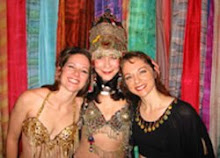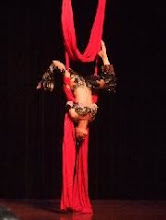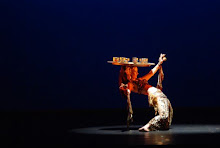This piece first aired on NPR's Marketplace in 2003. I got to record it for the radio on location in the WBUR studios. I was told that in my speaking voice I had a "sibilant s" which is the first time I had ever heard that term. I liked the word and thought it should be spelled "sibyllant," like the Cumaean Sibyl. A prophetess, yessss. But no, my "s" sounds more like a hissing snake...which given the fact we are dancing the 'dance of the serpent' is entirely appropriate.
This photo was taken in 1978 at the Athens by Night Taverna where I performed every night with my mother Rhea of Greece. I was 8 or 9 years old.
Belly Dance Marketplace
My first lesson in economics came backstage at the Parthenon Taverna in San Francisco where my mom belly danced on Saturday nights. I was two years old, and already I knew exactly where money came from: it came right out of Mom’s coin girdle after a show. It was my job to pluck out the cash and count it up. One by one, I’d pull out the sweaty dollar bills, carefully uncrinkle them, and make humid piles of ten as she changed into her evening gown. The next day, we’d go to the supermarket and spend these same bills on fruit roll-ups and Ho-Ho’s – or at least that’s what I remember buying. Not only did I learn to count this way, but I intuitively knew that the number of grocery bags we carted home was in direct proportion to the amount of tips Mom had made the night before. She was a popular dancer, which translated to a lot of groceries in the trunk of our Morris Miner.
During that same year I made the more personal connection between shimmies and cash. One night I decided it was time to take to the raised stage with a costume pinned to my diapers. Audience members, beside themselves before the spectacle of this diminutive toddler belly dancer, leapt to their feet to tuck tips into my Lilliputian hip scarf. Among these admirers was a little boy, sent up by his parents to add to my wealth. Upon seeing my cash bounty waving gaily at him from my costume, the boy sought instead to make a cash withdrawal. We wrangled over the money and I won, of course. My mother didn’t teach me to sit back and just let things happen to me. I learned early that once having acquired money, you must fiercely protect it to prevent its loss.
It wasn’t until the age of seven, after Mom had moved to Greece, that I began to dance professionally in earnest. The currency was now foreign, but the fiscal concept was the same: if I danced during Mom’s performance, she would pay me 100 drachmas a night. Since I enjoyed dancing and preferred to be up on stage with Mom rather than getting my little freckled cheeks pinched by the Greek waiters in the kitchen, it worked out rather well. Plus I learned that if you saved up your money over time, you could buy things that really mattered. By the end of the summer I had it all: a bicycle, a bracelet, and lots of magazines with Charlie’s Angels on the cover.
The one thing that Mom never really taught me about was banks. For whatever reason, we saved our money in hats, boxes, books, hollowed out cabbages in the fridge. Our cash may not have earned interest, but it did gather dust and mold. Eventually I learned that a penny saved is just that: a penny saved. I stopped saving up to buy stuff and learned to love the process of just saving up, watching my stash grow, thinking that eventually I might need it for something really important and I’d be able to provide it for myself. Indeed, my childhood belly dancing earnings quickly got swallowed by my college tuition bills, but I’m pretty sure it was worth it: after earning a B.A., M.A. and PhD in French Literature, I’m back to belly dancing for a living (that's a whole other story!)
The Marketplace essay had to be very short and ended there, but here are more of my thoughts on tipping that could come in handy for dancers or audience members. Aha - finally we reach the crux of the double meaning of my blog, "Tips from the Hip." OK I will spell it out: I am passing on "tips" about what I have learned about the nature of "tips" (money given by audience members as appreciation for a belly dancer's performance). These tips are things I learned from a childhood dancing literally at the hip of my mother, who also received tips in her hip. Have I beat this double entendre to death or what?
In the belly dance world, tips can be a hotly contested practice with two major camps: those who accept tipping as part of their dance performance and those who do not. There are valid reasons to stand on either platform and I respect everyone's choice especially if they have thought it through. I stand with my mother, my sister, and the long tradition of cabaret belly dancers who do accept body tipping at the hip, as long as there are off-limit zones and the practice is done tactfully and with humor, dignity, cultural sensitivity and wit. Belly dance has long struggled to attain a reputation as an honorable art form, as important, reputable and well-considered as ballet, modern and jazz dance. Great belly dancers have worked hard in this country and others to elevate the art of belly dance and bring it to the theatre stage, removing it from the lively taverna atmosphere and cleansing it of its "hootchie kootchie" dance reputation from the time of the World's Fair in the 1800s. My sister Piper did her part in this by founding the BellyPalooza festival in Maryland and staging the "Belly Dance Magic" Show at the Baltimore Museum of Art theatre. My mother Rhea always does her best to rebel in these more rarified settings by leaping from the stage and dancing into the audience for a more immediate transfer of energy. She hates how theatre lights blind her and always makes the lighting guys put on the house lights when she dances -- she wants to see the audience and her affect on it. Guess which dancer got a standing ovation in the last Belly Dance Magic show! You can take Rhea out of the taverna but you can't take the taverna out of Rhea!
There is something magic about the taverna context and the community aspect of the tipping ritual. This is the time where the audience can show off to their friends and display their wild good natures, their wealth, their appreciation of the dance artist and join in the dance. Instead of passing the hat, belly dancers are given money showers, money necklaces, or respectfully tipped at the hip. If money falls to the ground we dancers do not stoop to pick it up with our hands - this is considered very bad form. Tipping time is often an expected part of the dance in a taverna / restaurant context, and the dancer must be a superb diplomat in nonverbally guiding the audience to the most respectful way to tip her. She must understand different cultural mores. When I haven't "gone around for tips" customers have mournfully approached me later with the reproachful "you didn't come around to our table," and pressed a crumbled bill into my hand.
The art of going out for tips is a performance unto itself, where the dancer must be able to read the make up and mood of each table, decipher what country they might be from, divine who is the one everyone would like to see celebrated or teased, understand who would like to get up and dance, who would prefer to stay seated, and who would, after protesting they don't want to dance, actually secretly enjoy be dragged on to the stage. You can learn a lot by just placing a hand lightly on a shoulder and reading the person's energy. If it resists and is hard as a rock, better leave the person alone. If you sense a movement, pliability... they want to come and dance!
Tipping time is the ultimate improv situation. The dancer must be ready for anything. She must be gracious and quick -- and above all, not act like it is about money, for in the end, it is not. It is about the ritualized interaction between a modern day goddess and the audience who has just been transported by her hip work and grace to another dimension.
I always tell dancers I mentor: Never count your money in front of the customers! Never pick up tips that fall to the ground! Never leave your tips unattended in the bathroom. Never let your boyfriend collect your tips. Always tip others who help you. Beware little old ladies who lean in to tip you in your bra strap. One elderly woman once knuckled my nipple when I least expected it. I didn't waste my energy getting pissed off -- I just laughed it off and moved on, marveling at the new ways I realize I must be on guard when I'm in the tip zone. Spectators, please don't tip me when I'm balancing a tray of lit candles on my head, the fire is real and the tray is not held on by glue!
Tipping is the ultimate landscape for social anthropological study. What type of person will first tip the dancer? Whoever you are, we love you! If they leap to the stage and shower you with a stack of bills, goddess bless them! Others follow suit. If they come up on stage with a $20 bill and respectfully tuck it into your hip for all to see, goddess bless them! Others may follow suit. If they wave a $1 like its the Hope Diamond and summon you over whispering "this is for you if you take care of my friend over there" - whoosh! You will see Melina disappear from your orbit leaving the dollar waver still gripping his dollar which is now fluttering in her wake. If you find little kids trailing you like the pied piper -- train them to pick up all your tips and put them into your prop box -- goddess bless them! Don't linger by patrons who haven't tipped you or lunge for money just because its held out. Dance, laugh and keep it family friendly.
I have uncrinkled steaming money from every country of the world. It connects me to the world and the world to me. It is an honest tangible exchange. I learned the many techniques of dealing with tips and tipping from watching my mother, who has a knack for humor and human relations. You learn how to engage, who to ignore, and when to run.
Melina's belly dance and circus arts studio is Moody Street Circus in Waltham, MA. Ongoing classes in the dynamic, organic Daughters of Rhea "vintage oriental" style - check studio calendar for listings.
skip to main |
skip to sidebar
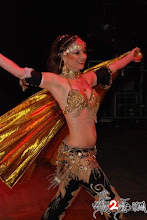
The Wild Belly Dance Pants Look

Empowering Spirits through a Community of Wild Hips! Photo by Mark Curelop.

Our favorite place...Philapappou Hill in Athens
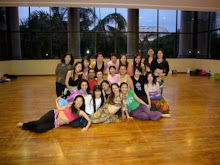
See you in April/May 2009!
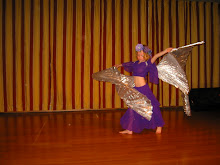
Silver Wings at Ancient Art Studios

Melina and students dancing it up

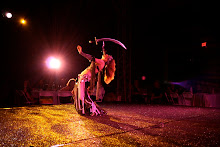
Taking a classic prop to new heights

Post-Performance Poses

I'm just a Platform Wallenda...You won't catch me out on the wire...
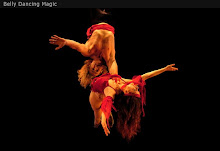
Romance in the Air

Melina, age 8, atop Gypsy's shoulders in Pickle Family Circus

Melina's Brave Husband in Korean High Wire Championships - crossing the Hangang River on a 1 km wire!

River Crossing by High Wire....

Melina's Dad who she roped into being a Snakecharmer for a gig
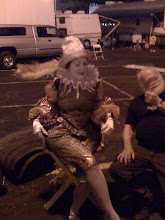
Melina's Extraordinary Step-Mother!
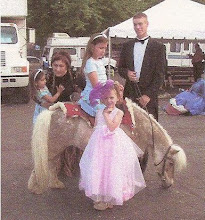
Zoe in Pink, Jack in the Tux, Mrs. Olinka Wallenda, Amber and Ysabella...

Singapore Concert at Victoria Theatre
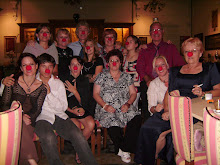
A bunch of clowns at Alex's wedding!

...why not try it? Melina in Tuscany
Belly Dancer ~ Circus Artist ~ Reiki ~ Qi Gong ~ Tarot ~ Movement Medicine
Melina of Daughters of Rhea's Fan Box
Melina of Daughters of Rhea on Facebook
Melina at Roxy Gala Bash

The Wild Belly Dance Pants Look
Melina's Wonderful Daughters of Rhea at Moody Street Circus Students1

Empowering Spirits through a Community of Wild Hips! Photo by Mark Curelop.
Followers
Melina and Daughter Zoe hanging out on Ancient Greek Columns

Our favorite place...Philapappou Hill in Athens
Flying Wallenda's 7-Person Pyramid
Melina with amazing students in Singapore

See you in April/May 2009!
Daughters of Rhea Company Founders Melina and Piper
Melina's sister Piper's website
"A Hippie Conception" - Melina Writes in Gilded Serpent
Zoe the dancing Sprite - 3rd generation belly dancer!

Silver Wings at Ancient Art Studios
Melina, age 11: Wild Gypsy in Training
Belly Dance Recital

Melina and students dancing it up
About Me

- Melina of Daughters of Rhea
- Here for love and enjoyment of movement, following intuition and celebrating life. Through belly dance, we tune into the energies of the cosmos and flow energy: Circles, spirals, waves, ripples. Follow your curiosity & trust your instincts! Stand in your knowing, your power & your authority. Every choice can be a gateway to more love and harmony! You are brave and wise.
Melina's Sword/Dagger Dance in Cirque Passion
Taking a classic prop to new heights
Melina and Sacha in Singapore
Post-Performance Poses
Melina (far right) as a Flying Wallenda Lady in New Zealand

I'm just a Platform Wallenda...You won't catch me out on the wire...
Melina and Sacha's Trapeze Duet

Romance in the Air
Clowning around since childhood...

Melina, age 8, atop Gypsy's shoulders in Pickle Family Circus
Sacha Pavlata

Melina's Brave Husband in Korean High Wire Championships - crossing the Hangang River on a 1 km wire!
Another view of Sacha on the wire

River Crossing by High Wire....
Flying Wallendas Breathtaking 7-Person Pyramid on the High Wire
Snakecharmer Dad Phil

Melina's Dad who she roped into being a Snakecharmer for a gig
Cecil MacKinnon as YoYo in Circus Flora

Melina's Extraordinary Step-Mother!
Back stage with Mikey at Circus Flora

Zoe in Pink, Jack in the Tux, Mrs. Olinka Wallenda, Amber and Ysabella...
Melina, Sacha and Kyoko

Singapore Concert at Victoria Theatre
Pavlata Family Portrait...

A bunch of clowns at Alex's wedding!
If you have an idea...

...why not try it? Melina in Tuscany
Copyright Notice
© Melina of Daughters of Rhea and Tips from the Hip, 2016. Unauthorized use and/or duplication of this material without express and written permission from this blog’s author and/or owner is strictly prohibited. Please give credit where credit is due and thank you!






